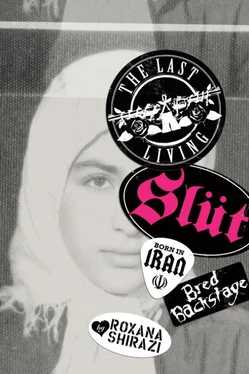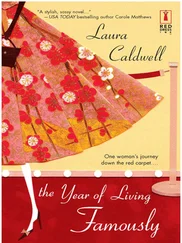My uncles grew increasingly frantic. The new Islamic regime was torturing and executing everyone caught criticizing the government in any way, along with anyone thought to harbor left-wing, anti-government views—the pro-monarchists, the liberals, the intellectuals, anyone who did not actively follow Islamic practices. Even teenage girls who resisted religious teaching at school were considered potential threats and imprisoned, tortured, and executed.
My family began burning left-wing literature in the house. Late at night, I’d sit with my parents and relatives as they drove to the edge of town to dump boxes and boxes full of dangerous papers in the secret black waters of the river. All the freedom fighting, the turmoil, the blood spilled to liberate us from the Shah’s dictatorship had only put us in a far more dire situation.

I Decided that I would try it with Two Boys, While in The Next Room War Songs Blared out from The Television.
My baby brother came along, chubby and dribbly, smiling a fat, toothless smile, on March 21, 1980. It was Eideh Norooz , the non-Islamic holiday that also marks the first day of spring and the New Year.
My stepfather rushed my mum to the hospital that day, leaving my grandmother, aunts, uncles, and me waiting for news. We sat around the Haft Sin table. Haft Sin, meaning seven Ss, refers to seven specific items beginning with the letter S in the Persian alphabet that must be placed on the table during Norooz. Each of the items symbolizes a different concept: Sib are apples symbolizing beauty, senjed is a dried fruit that symbolizes love, sir is garlic, sabzeh are wheat sprouts grown in a dish for the occasion, somagh is the cooking spice sumac, sonbol is the plant hyacinth, and sekkeh are coins symbolizing prosperity. Decorated eggs, a mirror, lit candles, and a goldfish also crowned the table.
In all the excitement surrounding the new baby, I forgot about the holiday gifts. I didn’t need any—my brother, that chubby little bundle of sunshine, was the best present in the world. That day, I wrote my new brother a letter telling him how much I loved him and that he was a natural-born beauty.
Six months later, war erupted between Iran and Iraq. Air-raid sirens began shrieking like caged beasts. The sirens screamed every day. They scared the shit out of me, making me think we were about to get bombed, slaughtered.
All day, every day, military songs blared from our TV. The government wanted each male citizen—even old men and teenage boys—to fight the Iraqis. They promised martyrdom, an automatic free pass to heaven. We could not turn away from the broadcast images of families waving good-bye to their sons. A few boys from our street left to fight Saddam. Their mothers wailed hysterically from the pain of the sacrifice their sons were making for Islam.
During this time I took frequent walks to my grandmother’s house, either after school or in the early evening, as the grieving dusk prayers boomed from the mosque’s loudspeakers. Doom and fear hung thick and stagnant in the air as more and more men were called to war. The dusty nights were bleak, the street vendors increasingly desperate.
Walking beyond the main street, with cars violently whizzing past, angry drivers screaming, and armed men in Jeeps looking at me funny I’d smell the aromas of cooked liver and freshly baked nooneh sangak. I passed the pastry shops with strawberry-glazed cream puffs and crumbly confections in the windows. Dolls with spider-leg eyelashes and exotic animal toys with drum sets slept in shops, closed for the night. Teenage boys, likely just days away from war’s brutality, pedaled bicycles along the sooty streets. The rich little girls held tight to their daddies’ hands by florist shops crammed full of funeral wreaths and bridal bouquets.
I would run to my grandmother’s house, pressing my head against her heaving bosom and big belly. I breathed deeply, inhaling her love. It was a small, safe place in the world. I no longer missed my real father: My new dad taught me how to ride a bike, holding on to the back and running behind and letting go only when I told him to. He taught me how to dine like a lady, but he also slapped me when I was bad.
One day, as I played with my bike in the yard with my mum and dad, my first daddy appeared, tall and slim with his film–star–tinted glasses and lovely lips. Avoiding eye contact with me, he walked right up to my new father. His whisper was dry and straight to the point: “I don’t want to have any more responsibility for her. I won’t be seeing her again. You can officially be the dad.” Then he turned and left as hurriedly as he’d come. I looked down at my bike, at the Pink Panther stickers on the plastic between the handlebars, at the glitter-sprinkled dancing dolls in the basket, and I felt like nothing. I knew that I was damaged goods.
It was around this time that my stepfather first beat me. I remember standing in the shower where a bright, fresh pool of blood gushed from my nose and stained the water. My face was all puffed up and ugly and I fucking hated looking ugly. I thought I deserved it because I’d been a smart-ass, and getting smacked in the face was part of the deal for a cheeky kid who answered back. No one stood up for me, not even my mother; after all, he was her husband now, and Iranians don’t discuss such things. It brings shame on the family.
By now my brother was a toddler. He would wiggle his wobbly jelly bottom whenever a war anthem played on TV, which seemed to be every five minutes. There was practically a funeral a day in the neighborhood. Shrines dedicated to the local martyrs sprouted up all over town; gorgeous colored lights bathed the dead soldiers’ photos. At night, while the lizards slithered near the lamps in our yard, bombs destroyed the smaller southern cities, and even Tehran endured the occasional blast. When the sirens sounded, we swarmed into our block’s underground parking garage for shelter.
Despite the terror, I thought life was still grand. I loved my friends and was the top student at school. I studied the Qur’an and devoured my textbooks, hungrily lapping up lessons in science and history. Religion was different, however, because religion made me feel peaceful and at one with God—especially since it was everywhere: on TV, blaring from the mosque’s loudspeakers, and at school, where heaven and hell were constantly drummed into our brains. If I was a good girl and said my prayers every day and loved God, I would go to heaven. If I was a naughty girl, flaunting my sexuality and flirting with boys, I was destined for hell.
God, I tried to be virtuous and pure. I tried so hard. But I was tainted by my dirty thoughts. I just couldn’t help myself. They became real every day when I played with my boy cousins and neighbors in private, hidden from the eyes of adults. I would get naked and rub my eight-year-old chest against my cousin’s bare torso. Then in the afternoon I’d find my nine-year-old neighbor, a boy named Hamid, and get him to play doctor-and-patient with me. I would undress, climb in bed, make him examine me down there, and lie silently, letting him explore. I would bring Soraya and Zari to my room and ask them to look at my body and touch my private parts, relishing every sigh, every touch, every finger. In the midst of it, I could still feel God looking down upon me with loathing.
One night I decided to try it with two boys. I had exploding feelings in my tummy but no logic in my head. While my parents and family friends gathered in the living room to talk politics and war songs blared from the TV calling everyone to sacrifice their sons, I brought my younger boy cousin, Kian, to my room and asked Hamid to join us.
Читать дальше













